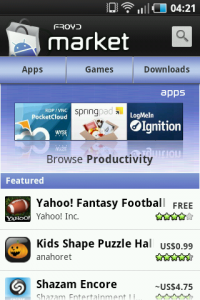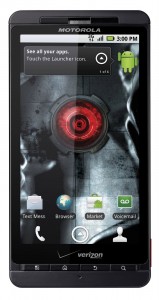Smartphone Showdown: Android vs iOS
The Android operating system and iOS (the iPhone’s operating system) are the two titans in today’s Smartphone market. We’ve pitted the two platforms against each other in a battle amongst several categories which are integral to a Smartphone.
Ease of Use
Creating a product that is extremely simple and easy to use is Apple’s forte. The iPhone has a uniform experience throughout all of its versions. The Android platform tends to be different from manufacturer to manufacturer, and the interface is more complex than iOS’s. This point goes to iOS, no contest.
iOS=1 / Android=0
Flexibility
Part of what makes Android a bit more complicated to use than the iPhone is its flexible platform. You can easily alter your Android interface to focus on social networks, multimedia, apps (like the iPhone), or all of the above. Score a point for Android.
iOS=0 / Android=1
Hardware
The iPhone 4 has impressive hardware specs, but with a design refresh only once a year or so, you’re stuck with any design flaws it might have (such as poor antenna placement). The Android platform on the other hand has an entire slew of devices available, many easily matching the iPhone 4’s capability, and even several surpassing it. It’s a closer race in this category, but the point still goes to Android.
iOS=0 / Android=1
Network
One of the biggest drawbacks of the iPhone is the network it’s on. AT&T has become a victim of the iPhone’s success, and its network has become a mess of bottlenecked traffic. Android offers devices on all of the major cell carriers, so not only can you avoid AT&T, you can also choose the carrier best suited for your area. Rack up another for Android.
iOS=0 / Android=1
Multimedia Playback
The iPhone has always been an excellent multimedia device. In terms of fluidity and ease of use, it easily beats most Android devices, but Android has an advantage in that it does not require the use of iTunes. With Android, you can simply copy your songs and videos to your devices and play them directly, or you can purchase them through the AmazonMP3 app from your phone. We’re calling this one a tie.
Apps and Development
The iPhone certainly has more applications available than Android, but Android is also catching up very quickly. The iPhone’s App Store is also easier to navigate than Android’s Marketplace, but where Android really shines is application development. Android offers a completely open environment for developers, as well as true multitasking capability (unlike the iPhone 4’s limiting API’s for some multitasking). This gives Android far more potential than iOS, but since iOS is currently ahead in the game, we’re calling this one a tie as well.
Fragmentation
Fragmentation is a development term having to do with accounting for all of the different types of devices available. In short, it’s a bad, bad thing. Because the iPhone is really only available in a few flavors (the original, 2G, 3G, 3Gs, and 4), there are really only five devices to account for when developing an application (even fewer when you consider the original and 2G versions are essentially obsolete). Android on the other hand has hundreds of devices coming out, some with powerful hardware, others created as entry level devices. This makes development much more difficult, making iOS the clear winner in this category.
iOS=1 / Android=0
Conclusions
Tallying up the points, Android comes out as the winner with three wins compared to the iPhone’s two. This doesn’t necessarily mean that the Android platform is right for you. You should consider which categories each platform excelled in and attribute additional weight to those categories you feel are more important to you. Both offer very capable Smartphones, making neither a bad choice.
Results: iOS=2 / Android=3
PS: Scan products and get reviews on the go with alaTest’s new iPhone app and Android app.







I’ll stick to my android no matter what!!
Hmm well I am still making my mind.. I just want something which works.. and easy to use.
I guess the iPhone is for me right?
Well Android “works” as well but you have a variety of models to chose from which could make your task a bit difficult if you’re not the tech-saavy kind. I’d say go for iPhone..
@Philip
If this will be your first Smartphone, both Android devices and the iPhone will have about the same learning curve. The biggest advantage Android gives you is the option of choosing your provider as well as picking out the hardware that best suits your needs. This earlier article should help you decide on a phone: http://alatest.com/blog/smartphones-the-big-fours-top-four/
If you’re already used to the iOS interface though (such as coming from and older iPhone or an iPod touch), you’ll likely feel more comfortable with the iPhone 4.
I´d say: go for style and buy an iPhone!
Thanks for the input guys!
@Sander
If style is your main criteria, you should definitely go for iPhone.
@Philip: So have you bought an iPhone??
And did you see the new Macbook Air? Cool stuff:
http://alatest.com/expert-reviews/laptop-reviews/apple-macbook-air-11-6-os-x-core-2-duo-1-4ghz-2gb-ram-64gb-flash-29-5cm-11-6-wxga-1366×768-glare-led-geforce-320m-256mb-kein-optisches/pe3-124166888,30/
That looks SWEEEEEEET!
haha well, this month is not exactly the best for me to buy it but I might be able to kindly request it for Xmas
Macbook air huh? I have a pro 13,3″ already and it does the job like a chief so no need to upgrade right now and most probably for the next 3 years, but thanks for the tip!
gr8 resrch bro…
In terms of batteries, which one holds a longer charge?
@Philippe
You can’t really put it into those terms. iOS and Android are operating systems, and battery life depends on the hardware used. It would be kind of like asking, “Which car gets better gas mileage, a Toyota or a Honda?” Obviously, both companies have car models that get good gas mileage (like the hybrids) and those that get poor mileage (like SUVs). You can’t compare the gas mileage between the two unless you get into specifics and do it on a model by model basis.
@QuantumRand
Thanks for the info! You’re right, there are dozens of Android out there. So any idea which Android holds a loooong charge?
@Philippe
Out of the Android phones I have experience with, the Droid X and Droid 2 both lasted a fair bit longer than the others under heavy use. I haven’t had the chance to try the HTC Desire Z (the USA T-Mobile G2) or HTC Desire HD (The USA T-Mobile MyTouch 4G). Both of those phones use very new processor architectures, so I’d be willing to bet the Desire Z likely gets very good battery life with the Desire HD right behind it.
Google Inc. may lose business as Verizon Wireless starts selling Apple Inc.’s iPhone, giving the carrier’s customers a new alternative to smartphones running the Android operating system.